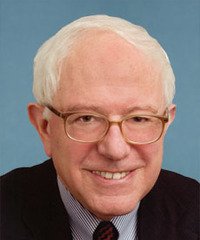
Bernie Sanders is serving his third term in the U.S. Senate after winning re-election in 2018. His previous 16 years in the House of Representatives make him the longest serving independent member of Congress in American history.
Born in 1941 in Brooklyn, Sanders attended James Madison High School, Brooklyn College and the University of Chicago. After graduating in 1964, he moved to Vermont. In 1981, he was elected (by 10 votes) to the first of four terms as mayor of Burlington. Sanders lectured at the John F. Kennedy School of Government at Harvard and at Hamilton College in upstate New York before his 1990 election as Vermont’s at-large member in Congress.
As a member of both the Senate Environment and Public Works Committee and the Energy and Natural Resources Committee, Senator Sanders has long fought for progressive energy policies, strong environmental protection, and aggressively reducing carbon emissions to address global climate change.
Climate Change
Virtually the entire scientific community agrees that human activity is a significant driver of global warming. The United Nations’ Intergovernmental Panel on Climate Change warns that if we do not drastically reduce greenhouse gas emissions, the already-disastrous effects of global warming will get much worse – including crop failures, increasing hunger and illness, more extreme weather, and extinction of species. As the wealthiest country on the planet and the second largest emitter of greenhouse gases, the United States needs to lead the fight against global climate change. We have a moral obligation to preserve this planet for future generations.
Senator Sanders believes that climate change is one of the greatest existential threats facing the planet. That is why he has introduced a number of bills to address this crisis:
The Green New Deal
United States must lead the world in transforming our energy system away from fossil fuels to sustainable energy. But let’s be clear, the Green New Deal is not just about climate change. It is also an economic plan to create millions of good-paying jobs, strengthen our infrastructure, and invest in our country’s frontline and vulnerable communities. That is why Senator Sanders is a proud original cosponsor of The Green New Deal resolution, which is a ten-year effort that outlines a transition to a zero-emissions transportation and energy sector, sustainable farms and ranches, a high-quality health care system, and stronger labor standards. Perhaps most importantly, the Green New Deal recognizes the importance of including everyone in the transition – from Coal Country to Indian Country.
Senator Sanders also introduced the Green New Deal for Public Housing Act, which would transition the country’s entire public housing stock into zero-carbon, highly energy-efficient developments that produce on-site renewable energy, expand workforce capacity and family self-sufficiency, and focus on community development. This bill ensures that everyone has a shot at economic and social empowerment.
Public Lands
Outdoor recreation is critical to Vermont’s quality of life and economy. In fact, 72 percent of Vermonters participate in outdoor activities like trail running, biking, skiing, and snowmobiling each year. The Vermont Department of Labor estimates that one in seven Vermont jobs depends on the outdoor recreation economy, which generates $2.5 billion in annual consumer spending. The benefits outdoor recreation provides in terms of public health and the economy make public lands conservation a clear win-win.
In addition to supporting important outdoor recreation bills, Senator Sanders is also a longtime supporter of funding for the Recreational Trails Program, which has been critical in developing some of Vermont’s premier trails. Senator Sanders is proud to have secured a $5.2 million grant for the 93-mile Lamoille Valley Rail Trail, a world-class, four-season, multi-use trail that, when complete, will run from Swanton to St. Johnsbury.
Furthermore, Senator Sanders, Senator Leahy, and Representative Welch previously introduced legislation to add the Upper Missisquoi and Trout Rivers to the Wild and Scenic Rivers System; the rivers received that designation in 2014, and it will ensure Vermonters are able to enjoy them for years to come.
Nuclear Safety
Senator Sanders is one of the most vocal critics of continuing government subsidies and special tax breaks for the nuclear industry, and has called for an end to the Price-Anderson government liability insurance program for nuclear reactors.
The closure of the Vermont Yankee power plant will help the state move toward safer and more sustainable sources of energy like wind, solar, and geothermal. Senator Sanders is working aggressively to make sure the decommissioning process for the plant happens quickly and safely, while giving Vermonters a seat at the table. His experiences with the Vermont Yankee plant led him to introduce the Nuclear Plant Decommissioning Act to give states and local communities a meaningful role in decisions regarding plant decommissioning. A provision of this bill was passed into law and brought the NRC to Vermont for a public meeting in 2019.